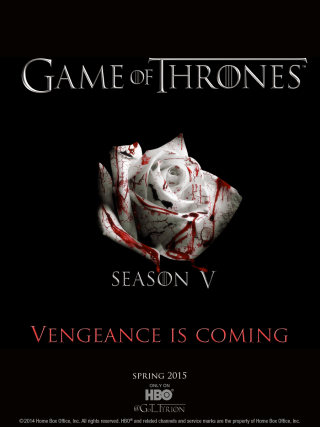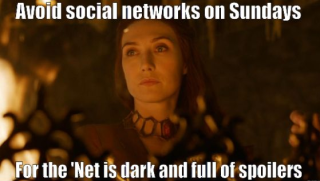Fans and fanatics sit with bated breaths as the fifth-season premiere of HBO’s epic fantasy series ‘Game of Thrones’ comes closer (Fourteen days to be exact. Not that I’m counting). The tale of warring families in the fictional continent of Westeros, generously interspersed with political intrigue, action and of course, dragons has unlike any show in the recent past, caught the imagination and curiosity of the world audience. The fact that it is to-date, the most pirated TV show in television history is testament to the global popularity of the show, a feat it shares with FRIENDS in the early 2000’s and Breaking Bad today. And yet, as the new season ushers in the coming of Winter, so does it present a new range of anxieties.

What is a spoiler?
Cyberspace today has become perhaps the most powerful medium of expression. The relative ease with which the internet is available to all is significant of how highly regarded it is as a form of social expression. However like any other good tool, cyberspace too has its demons, albeit some more minor than the rest.
Urban Dictionary defines a Spoiler as when someone reveals a previously unknown fact, which a person would likely have learned on his own. In other words, it is the knowledge of knowing something, before coming to actually know it. For many, readers and viewers alike, a spoiler is a huge deal-breaker, a sin that dissuades one to go through a book or a film or even a television show with defeated purpose. And yet for significant others, a spoiler offers a way of relief, a release of pressure against any surprises that might be in store for such reader or viewer; which is why a brick wall separates the spoiler and none-spoiler folk, always whether as a reader or a viewer. And it is this wall that grows a few notches higher every time, a new TV show or film or book comes into the picture, as is the case with Game of Thrones in the coming month.
Like other literature-based franchises, Game of Thrones fans are primarily divided into two classes: Book readers and Non-book readers (or the show-watching class). And while both share a common source of interest, both kinds of fans couldn’t be more different. In fact, there is an old joke which goes like this,
How can you tell if someone’s read the Song of Ice and Fire books before watching Game of Thrones?
Oh, don’t worry. They’ll tell you. They’ll be like, ‘Oh my God, this is that chapter, isn’t it? Just wait until you see what happens next.’
To quote Vinnie Mancuso, absolute power corrupts absolutely and absolute power of knowing how the Red Wedding ends turns you into an ass, apparently.
Now, as the new season of Game of Thrones starts next month, the most audible of gaps are those concerning whether the show will outstrip the books, its inspiration in terms of both pace and plot, a fact confirmed by the creators Weiss and Benioff recently. However, in the midst of this apparent ‘disentitlement’ of the book-reading class, the issue of spoilers remains simmering beneath the surface. And it’s not limited to Game of Thrones. Take the case of House of Cards, for instance. Parallel to the telecast of an episode each week, Netflix, the popular streaming website has also released the entire season of the same on its website (For a subscription fee, of course). Which is why, people are being discreetly careful as to what news and review of House of Cards they read on the internet.
It is silly to deny that with the ever-burgeoning length and breadth of the internet, we do indeed live in an age of spoilers. Together with a rising quality in film and television broadcasting, the digital space has provided a forum for fans and viewers alike to be more vocal, and even premature about their thoughts and opinions. Consequentially, it has also become a sanctuary for internet trolls who delight substantially in ‘spoiling’ a good show or film. As a result, if anyone really, really wants to watch a show on his own time, he must stay away from all forms of social medium, or as Dr. Sheldon Cooper would say, ‘go off-the-grid.’
The ‘Spoilers’ of War
There are those who argue that spoilers are not just bad, but horrible. And this notion, like almost everything today is supposedly backed by scientific reason. As a Yale University Professor noted in his book, the purpose of a medium of expression, whether a book, film or a TV show other than entertainment of course, is the blurring of lines between fact and fiction. His research further states that the main reason most people detest spoilers is that it reminds them of the fact that a story is just that – a story, and that it is harder to transport the reader or the viewer when it is evident how it is going to end, predictably. And, this is a side I strongly side with. I personally would throttle anyone who spoils any plot or arc or even any minor detail for me because I feel that the total joy I get from watching or reading anything is only equal to the sum of all its parts put together. Each and every detail for me, and I’m sure many others like me add to the sum experience of such a medium.
And then there are those, who don’t mind, and some who in fact look forward to spoilers. For many, and perhaps rightly, certain levels of spoilers are a necessity for any kind of audience. In fact, they argue, the synopsis of any show, film or a book, a recap or even a review of any of these mediums of expression is a spoiler in itself. And their usefulness, is determined by the fact that each of these, whether a recap, synopsis or a review decides whether a person gives audience to such shows or films. The validity in their latter point notwithstanding (After all, a total blanket on the contents of a book or an entertainment medium will substantially discourage an audience), a spoiler can also mean any detail discouraged by the producers to be released. Producers will want the synopsis of a show or film released, never the entire plot or story, a commodity often spoiled on the internet.
Any hope for truce?
There is a point to the arguments of both sides of this debate; which makes a balance between both an even more difficult ask. An attempt to pacify such debates is met with difficult questions such as ‘What constitutes a spoiler?’ or ‘How long a time period must pass so as to constitute a spoiler?’ Answers vary, and the debate rages on. In fact, even famous celebrities have pitched in with author Stephen King tweeting ‘C’mon guys, it’s been 15 years since the book’s been published,’ after spoiler-fears on the fourth-season premiere of Game of Thrones. Even George R R. Martin kicked the hornet’s nest when he stated that he doesn’t understand why anybody is worried about spoilers.
The option of spoiling the excitement and thrill of reading a book or watching a film or TV show is open to choice. What however, the internet has turned into is a kind of digital Hunger Games where ardent fans are forced to go into hibernation to avoid meeting someone and getting their excitement ‘killed.’ Even attempts to counter spoilers have been futile like the aforementioned case of Netflix and the telecast of House of Cards, which have in fact gone on to spoil the best part of television: Talking about television.
Efforts to find a balance are further hampered by the inherent faults with television programming. Game of Thrones for instance, is telecast in the U.S.A on different times for different time zones. Keeping aside the time difference, there remains a significant time frame between the telecast of the show in the East Coast and the Pacific Coast. Furthermore, this time frame is even wider when considering the telecast of the show in other countries across the world. True, this year HBO has devised a simultaneous telecast of the show in foreign countries (Including India), but the same shall be done at odd hours, with very few except the die-hard fans to witness (6:30 am, in case anyone’s wondering). By the time most of us wake up, the social media will be up in arms with ‘spoilers,’ and then consider your appetites spoilt.


I am one of the many people who go through the rigors of technological isolation every time a new episode of my favourite show airs. And although many of us use Tweetdeck to mute potential spoiler hashtags on Twitter, or filter their Facebook newsfeed to stay away from such spoilers, the sheer absurdity of the entire escapade still amazes all. If a 140-character tweet has the potential to ‘spoil’ a book, film or a TV show, then it must however be used sparingly, especially when the subject concern is a thriller or a suspense where, as the cliché goes, the journey is more exciting than the destination.
‘Spoiler-culture’ as the term goes, remains a conundrum. The idea of a spoiler and the idea of its very utility differ from person to person, which is why it is often difficult to even point out whether it is a good thing or bad. It is therefore, an inevitability of a highly digitized and globalized world. And mayhaps, there is a chance it may feel good, or make the satisfaction of having one minor detail go unspoiled all the more sweeter. As for the readers of A Song of Ice and Fire, maybe this is retribution for every time we tried to annoy our fellow TV-watcher. Maybe, we deserved this.






























